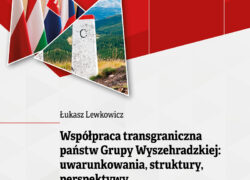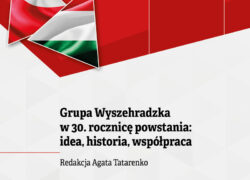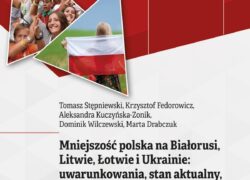


Wpływy rosyjskie w regionie Bałkanów Zachodnich Cz. I: Serbia, Kosowo

Współpraca transgraniczna państw Grupy Wyszehradzkiej po 1989 roku: uwarunkowania, struktury, perspektywy

Jak rozpędzić gospodarkę, czyli polityki innowacyjne państw Grupy Wyszehradzkiej
![[Zdjęcie: Rafael Henrique/Zuma Press/Forum]](https://ies.lublin.pl/wp-content/uploads/2020/10/forum-0533640318-250x180.jpg)
The impact of COVID-19 on the fiscal policies of the Central European countries
Within six months of the announcement of the COVID-19 pandemic, the Central European countries spent nearly 10% of GDP on fiscal support. This decisive response by governments is mitigating the effects of the economic crisis, saving companies and preserving jobs. However, an increase in expenditure with lower budgetary revenues inevitably leads to a deterioration in the sustainability of public finances.
An unprecedented fiscal response. The current economic crisis caused by the COVID-19 pandemic is unprecedented for the emerging Central European economies. The final scale of the slowdown this year is not yet known, but the forecasts of the International Monetary Fund (IMF) in October indicate a decline of 5.5% (average for EU countries: Bulgaria, Croatia, Czech Republic, Estonia, Lithuania, Latvia, Poland, Romania, Slovakia, Slovenia, and Hungary). However, this is slightly less than predicted at the beginning of the pandemic. In April, the IMF predicted a decline of 6.4% in these countries.
Not without significance in the improvement of this forecast was another, equally unprecedented economic phenomenon during this crisis, a fiscal response – a record of both global and national levels. To stop the spread of the virus and save businesses and jobs, governments around the world have so far spent USD 11.7 trillion, or nearly 12% of global GDP[1]. In the Central European countries, it was USD 175 billion, representing less than 10% of their GDP. This amount includes direct fiscal expenditure – USD 78.5 billion, of which USD 11.3 billion was allocated to the healthcare system and USD 67.2 billion to people and businesses in difficulty due to the pandemic, for example, for allowances, grants, or tax reduction. It also includes supporting the liquidity of enterprises from the public sector – USD 96.1 billion, for example, loans, guarantees, and capital injections.
Nominally, the largest fiscal support was prepared by the largest economy in the region, namely Poland with almost USD 68 billion. Next was the Czech Republic with USD 48 billion, and Romania with USD 13.4 billion. However, in relation to GDP, the greatest support was provided by the Czech Republic with almost 20%, then Slovenia with 14.5%, and Poland with less than 12%, while the smallest countries that joined the EU the latest, Bulgaria, Romania, and Croatia, within 5–7%.
An unprecedented debt. However, the decisive government response to the pandemic’s economic impact in the form of extensive fiscal measures, along with loss of revenues from falling output, leads to an increase in public finance debt.
In a non-crisis practice, according to The Stability and Growth Pact adopted in 1997, EU Member States are committed to budgetary discipline. They should keep the public deficit at a level not exceeding 3% of GDP, while public debt should not exceed 60% of GDP. Otherwise, an excessive deficit procedure is imposed on the Member State concerned in order to persuade it to take appropriate measures in this regard. After the debt crisis in 2012, another document was adopted to discipline the public finances of individual EU Member States – The Fiscal Stability Treaty, approved by the 25 EU countries at the time (except the Czech Republic and the UK). Both deficit and debt to GDP criteria have been maintained, while the way to respond to their excess has been strengthened, especially for countries in the Eurozone.
In May 2020, the European Commission (EC) announced that this year all the countries concerned would not meet the first criterion, and some of them would not meet the second criterion[2].
According to government plans, the public deficit will be on average twice as high as allowed by the EU – it will amount to 7.7% in relation to GDP. The highest was established by the authorities of the Baltic states, followed by Lithuania 11.4%, Estonia 10.1%, and Latvia 9.4%. On the other hand, at the end of the year, the public debt in relation to GDP would be at an average of 55% in the Central European countries, while in 2019, it was at an average of 43%. The EU’s public debt level will then be exceeded in Croatia 86%, Slovenia 82%, Hungary 73%, and Slovakia 61% (near this value – Poland 55.2%, Latvia and Lithuania over 50%).
An unprecedented recommendation. Despite such disturbing indicators, the EC did not recommend that additional Member States should be subject to an excessive deficit procedure in May (only Romania is currently covered). A revision of this position was announced in the autumn, but no change should be expected. In the face of the current economic crisis, the EU institutions recommend that the Member States take all necessary measures to effectively tackle the pandemic and save the economy. Therefore, the fiscal rules were temporarily suspended and the rules on state aid were loosened.
Already on March 13, 2020, the EC announced a Coordinated economic response to the COVID-19 Outbreak, which, inter alia, gave Member States the opportunity to implement the necessary measures to stop the spread of the virus and to mitigate the negative socio-economic impacts of the pandemic. The IMF also pointed out that increasing levels of public debt are not the highest risk at present. The priority in the near future is to avoid early withdrawal of fiscal support.
At the same time, the EC emphasizes that, given the unprecedented fiscal packages adopted in the Member States and as a result of the increased role of the public sector in the economy, it is important that public administrations are effective and efficient. It should be borne in mind that in normal circumstances, as a rule, public financial support for private companies is prohibited, as it distorts competition within the free market. The support given in the face of the unprecedented crisis that we are experiencing today can also distort competition in individual markets and encourage abuse.
Conclusions. Since the beginning of the COVID-19 pandemic, the Central European governments have focused on reducing its consequences. Six months after the outbreak of the pandemic, fiscal measures taken by them are counted in hundreds of billions of dollars (with significant differences within individual countries, from the Czech Republic, which supported almost a fifth of its GDP, to Bulgaria, Romania, and Croatia, which have, by the same token, delivered only a fifteenth part).
This high level of support also results in an imbalance in public finances. In 2020, all governments in the region set a deficit higher normally acceptable to the EU. However, the problem of rising levels of public debt is not seen as a priority.
Given of the apparent increase in the number of infected countries in Central Europe and as a consequence of a number of decisions by governments to re-restrict various economic activities, public financial support will certainly continue. The EU institutions indicate this as a good way out of the current crisis. They, therefore, temporarily suspended fiscal rules and loosened the rules on State aid. However, this does not exempt governments from the obligation to provide such support on clearly defined terms and in transparent forms only.
[1] IMF data as of September 11: International Monetary Fund (IMF), Fiscal Monitor: Policies for the Recovery, Washington, October 2020.
[2] Data reported by national authorities on 31 March 2020; no data available for Romania.
![[Zdjęcie: Russian Presidential Press and Information Office/TASS/Forum]](https://ies.lublin.pl/wp-content/uploads/2020/09/komentarze-ies-256-250x180.jpg)
Belarus and Russia – a Fraternal Iron Grip
A symbolic visit. Apart from the promise of a Russian loan to Belarus and the ‘calling Lukashenka to order’, who had been troubling Russia for a long time, the meeting in Sochi, probably only sealed the earlier decisions. At the beginning of September, Belarus was visited by Russia’s Prime Minister Mikhail Mishustin, with a delegation of various deputy prime ministers and ministers, which suggests that talks were held regarding specific solutions connected to the integration of Belarus and Russia, under Russian conditions, in exchange for Russia’s help to maintain power by the Lukashenka regime. The defense ministers of both countries also paid mutual visits. Deepening the political, economic, and military integration of Russia and Belarus is, however, a strategic goal, the implementation of which will probably be postponed as Russia’s priority is now to stabilize the situation in Belarus – understood as suppressing protests, keeping Belarus in its sphere of influence, and preventing, at least for a while, the overthrow of Alyaksandr Lukashenka.
Surprise and counteroffensive. Like Lukashenka himself, Russia was initially surprised by both the scale of the protests and the demonstrators’ determination. Observing the developments, the Russian authorities quickly realized that the events in Belarus, most likely irreversibly delegitimizing the system of power created by Lukashenka, could also pose a threat to them. Also, the Russian Government’s social legitimacy is weakening and, in the opinion of the Russian authorities, who are constantly afraid of any grassroots democratic movements, the protests of Belarusians could inspire and mobilize Russian society. Russia was also faced with a difficult choice: failure to react could bring a geopolitical defeat and a risk of “infecting” Belarus with democracy, possibly “exporting” similar sentiments to Russia. On the other hand, open intervention would further worsen the relations with the West and antagonize the Belarusian society, which is thus far favorable to Russia. However, the stakes turned out to be so high and the fear of another “color revolution” so strong, that the Kremlin had decided to take adamant steps – the poisoning of Alexei Navalny was probably meant as a warning to both the Russian and Belarusian opposition.
“The Russian world”. On August 27, President Putin made an unequivocal statement that he would not allow “the country closest to Russia” to drift towards the West and its institutions and leave Russian’s sphere of influence. Thus, he signaled that Russia would not accept a government that would not maintain an anti-Western and pro-Russian course in Belarus. At the same time, he warned the West against any interference in the internal affairs of Belarus, hinting also at the preparation of troops of the Russian law enforcement forces, which could be used on the territory of Belarus if necessary. The forces of the Russian National Guard, the so-called Rosguard, may be used outside Russia upon the president’s decision. From a formal point of view, there are legal bases that allow Russia to provide military assistance to Belarus which derive from both states’ membership to the Collective Security Treaty Organization and the Union State. However, such a solution would be too costly for Russia for political, financial, and reputational reasons.
Hybrid activities. There are many indications that in order to prevent the emancipation of Belarus, but also not to jeopardize the relations with the West and the Belarusian society, Russia has chosen the already proven variant of hybrid actions, traditionally adapting its scope and instruments to the specific situation and trying to shift responsibility for the “hybrid warfare” to the West.
As early as August, Russian specialists in the field of propaganda began to help the Belarusian state media construct information narratives, the axis of which is to blame an external enemy, i.e., Western states and institutions, for the destabilization of the country. In the external dimension, this is supposed to discourage the West from taking more decisive actions towards Belarus. It can be noted that pro-Russian disinformation and propaganda activities, and discrediting the Belarusian protests, have also recently intensified in the Polish information space.
Compared to those used so far, based on brutality and arrogant rhetoric, which did not bring any results, actions against the opposition have become more multifaceted and sophisticated, which suggests the use of external help. The law enforcement forces have modified their tactics and the protesters’ arrests by the militia and OMON are ongoing. However, masked officers in uniforms without markings have also appeared, fueling tension in the atmosphere and risking provocations, especially since there are rumors among the protesters that it is Russians who are under the masks. There are visible actions aimed at taking full control over the flow of information: blocking the Internet and independent media, getting rid of foreign journalists, by withdrawing their accreditations or not allowing them to enter the country. At the same time, official Belarusian media outlets echo the Russian ones, initially appearing rather neutral towards the events in Belarus, but now shifted towards advancing the idea that Russians and Belarusians constitute one nation, and that Russia has not exerted and does not exert any pressure on Belarus, and that the protests are inspired by the West (including Poland). One by one, the groups of protesters are consistently intimidated, students, teachers, factory workers on strike etc., while the opposition Coordination Council is broken up by arresting its members or forcing them to leave the country.
Another typical instrument of hybrid activities is the polarization of society: not only pointing out the enemy, which in this case includes the Polish minority in Belarus and, from Poland’s point of view, is a disturbing signal, but also in line with the divide et impera principle, dividing the opposition. For example, the creation of a new opposition party (“Together”) was announced, which, however, declares support for the idea of constitutional changes instead of repeating the election. While the latter is one of the protesters’ main demands, the idea of constitutional changes is being pushed by both the Belarusian authorities and Russia. Although this did not have a major impact on the development of the situation or the balance of forces, it caused some confusion in the ranks of the opposition, especially since this concept was supported by one of Lukashenka’s most popular opponents in Belarus, namely Viktar Babaryka, whom Russia would probably be willing to accept as President of Belarus.
The twilight of Lukashenka. The rigging of the elections and the brutal pacification of peaceful protests definitely prevented Lukashenka from cooperating with the West at an exceptionally unfavorable moment, taking into account the condition of the Belarusian economy. Thus, he was forced to turn to Russia – since August 9, he spoke with Vladimir Putin more often than he had in the entire previous year. However, he is in a very weak negotiating position: the people of Belarus, most European countries, and international institutions, are against him, and his power is based solely on the loyalty of the government departments of force. However, this loyalty has its limits and may turn out to be shaky; if the constitution was changed and the president’s omnipotence was limited, this group would gain even more importance. Considering that almost all members of the Belarusian siloviki elite were educated in Russian (or Soviet) military universities and are well known in Russia, it should be assumed that this would suit Russia’s interests.
Nevertheless, Lukashenka, with Russian support, is likely to remain in power. His position, however, will be weakened; Russia will not forget him the anti-Russian rhetoric during the election campaign and the delay and blocking of the process of Belarus’ integration with Russia. It will also be inconvenient for Kremlin for utilitarian reasons, for example, it will be difficult for Lukashenka to rule without social legitimacy and under conditions of international ostracism, and this will backfire on Russia as well. Hence, the price of support provided to Lukashenka will be high. Perhaps he will be forced to accept the so-called Medvedev’s plan and the “road maps”, and possibly to transfer control over key enterprises (armaments, refineries, fertilizer producers) to Russia. The economic dependence of Belarus on Russia will deepen, and the Russian military presence is likely to increase as well. For example, it is possible that the Russian armed forces will be permanently present in Belarus.
Conclusions. Belarus will not change its geopolitical vector; it will not become anti-Russian; it will not seek integration with the West – Russia will not allow it, the West will not strive for it, and it is not what the Belarusian people fight for. For Russia, however, Belarus may turn out to be a big problem: if Lukashenka makes far-reaching concessions to Russia in exchange for support, the pro-Russian attitude of Belarusians may change dramatically – symptoms of such a change are already visible. At the same time, if Lukashenka does not have the support of Russia, its own nomenclature can turn against him which could only deepen the crisis. Russia, therefore, for its own interest, will not allow Lukashenka to be overthrown, but in the long run it will seek to replace him with someone “more comfortable” (e.g., as a result of early presidential elections – the sooner the better). It would also eliminate the protests and turn around Belarusians’ indignation, as well as appease the tense international situation.
By taking up this game, however, Russia has taken responsibility for the actions of the Belarusian regime which may cost it not only a further deterioration of relations with the West, but also the loss of trust of the Belarusian society, which, despite being favorable to Russia, has never wanted Belarus to be absorbed by it.

Uwarunkowania polityki rodzinnej Polski, Czech i Węgier

Grupa Wyszehradzka w 30. rocznicę powstania: idea, historia, współpraca
![[Zdjęcie: Jacek Szydłowski/Forum]](https://ies.lublin.pl/wp-content/uploads/2020/09/komentarze-ies-253-250x180.jpg)
(Dis)unity of the Visegrad Group countries in the face of the crisis in Belarus
The issue of Belarus is perceived differently in each of the V4 countries. So far, no agreement has been reached at the level of the heads of government. The statement of the presidents of the Visegrad Group, in which they called for dialogue between the Belarusian authorities and the society, to organize free presidential elections and to respect Belarus’ sovereignty was positively received. However, due to the systemic position of state leaders in individual political systems of the V4 member states, it is necessary to develop a firm position of the V4 by the prime ministers, regardless of the fact that the Czech, Slovak, and Hungarian approaches to the crisis in Belarus differ fundamentally, both in the details and the general view of the situation.
Czech Republic
After the outbreak of the crisis in Belarus, the Prime Minister of the Czech Republic, Andrej Babiš (ANO), emphasized several times that he strongly supports the conducting of free presidential elections in that country. He talked about it, among others, in his statement published in social media on August 16, 2020, where he added that the European Union should start negotiations with the President of the Russian Federation, Vladimir Putin, in order to prevent the escalation of the conflict and the development of events as in Ukraine (annexation of Crimea). Prime Minister Babiš’ commentary for one of the Czech newspapers was similar. In a text published on August 26, Babiš stated that the elections in Belarus had probably been rigged and that Alyaksandr Lukashenka had repeatedly violated basic civil rights by continuing to persecute the opposition and trying to suppress public protests. The Prime Minister of the Czech Republic repeated that the EU should mediate in Belarus and stressed his involvement in the issue of Belarus. In a cited article, Babiš said that he had contacted not only the EU leaders, but also the Hungarian Prime Minister, Viktor Orbán, and Polish Prime Minister, Mateusz Morawiecki, because unlike the West, the Central European countries have experienced firsthand what the Belarusians are now trying to do and, therefore, they have a better understanding of the situation. It is worth adding that in August the Czech Prime Minister met with representatives of the Belarusian minority in the Czech Republic.
A breakthrough in the position of Prime Minister Babiš in relation to the situation in Belarus was brought by the Polish authorities’ proposal that the opposition candidate Swiatlana Cichanouska should participate in the summit in Lublin organized by Poland on September 11, 2020. The Czech Prime Minister was the first V4 partner to refuse to meet with the candidate of the Belarusian opposition. He explained his approach by saying that he did not want to take hasty decisions that could turn out to be inconsistent with the EU position or could be used by Belarusian propaganda. The refusal to the invitation to meet with Cichanouska was criticized by representatives of the Czech opposition, including Alexander Vondra (ODS), who described it as a disgrace to the entire Czech Republic, and Markéta Pekarova Adamova (TOP 09), who called Prime Minister Babiš a coward.
The President of the Czech Republic, Miloš Zeman, and other presidents of the Visegrad Group countries, issued a statement on the situation in Belarus, on August 19, 2020 and before the European Council’s meeting. Within, they called on the Belarusian authorities to open the way to resolve the conflict and respect human rights and freedoms and declared their support for the organization of free presidential elections. The presidents of the V4 also called on foreign entities to refrain from actions undermining the independence and sovereignty of Belarus, however, they pointed to the role of the EU in establishing a dialogue between representatives of the Belarusian authorities and society. It is worth noting that President Zeman, apart from a joint statement by the V4 presidents, avoids making any statements about the situation in Belarus.
The Czech Minister of Foreign Affairs, Tomáš Petříček (ČSSD), also spoke about the conflict in Belarus. Like Prime Minister Babiš, he emphasized that the EU should first develop appropriate strategies for action in the face of the situation. At the same time, he warned against any external intervention. On August 24, the Czech Government approved the creation of a fund in the amount of 10 million CZK to help Belarusians affected by the restrictions of the regime of President Alyaksandr Lukashenka. The amount, obtained from the funds of the Ministry of Foreign Affairs of the Czech Republic, will be used to support civil society as well as legal and psychological assistance to people suffering repression as a result of participation in protests – including journalists.
The discrepancy in the Czech authorities’ approach to the crisis in Belarus clearly shows the position of the Chamber of Deputies of the Parliament of the Czech Republic. In a special resolution adopted on August 19, 2020, Members of the Chamber of Deputies condemned the brutal repression and the inadequacy of the Belarusian security services against Belarusian citizens, and expressed their solidarity with the repressed people while calling on the authorities to release political prisoners. At the same time, they rejected several drafts of detailed resolutions, e.g., on the non-recognition of the official results of the presidential elections published by the Belarusian State Election Commission and on the introduction of Czech sanctions against persons responsible for serious violations of human rights in Belarus. The deputies representing ANO, ČSSD, and KSČM who were present at the meeting, almost entirely voted against these resolutions.
Slovakia
Slovakia belongs to an informal coalition of states that supported a flexible EU policy towards Belarus. The growing repressive nature of Alyaksandr Lukashenka’s regime has made Slovakia to increasingly oppose violations of human rights and democratic principles. As a small state, it started using its soft power by supporting the third sector. Slovak non-governmental organizations started cooperation with their counterparts from Belarus in the late 1990s, and actively supported the Belarusian opposition during the next elections.
It was similar after the presidential elections in August 2020. Under the influence of the repression that hit the Belarusian opposition, the Slovak Government took an official position on the events in Belarus. The Belarusian authorities have been called to end the violence and respect fundamental human rights immediately, as well as to fairly investigate and punish the perpetrators of the persecution. Calls were made for the immediate release of the detained participants of peaceful protests and establishing a dialogue with civil society, leading to a quick repetition of the presidential elections. The government has also announced the opening of borders and asylum for protesters, as well as scholarships for students expelled from Belarusian universities. The special role of the EU in solving the crisis in Belarus was emphasized. Slovakia’s President Zuzana Čaputová also expressed full support for the government.
The attitude of the Belarusian ambassador to Slovakia, Ihar Laszczeni, also influenced the attitude of the Slovak authorities to the situation in Belarus. In a video published in mid-August on the Internet, this experienced diplomat and former advisor to President Lukashenka expressed his solidarity with the protesters in Belarus. The ambassador of Laszczenia said that “like all Belarusians” he was shocked by the news of torture and beatings in his state. He stressed that in Slovakia he represents “Belarus and the Belarusian people, which according to the Constitution are the only source of power”. Slovak diplomacy took note of the fundamental statement of the Belarusian ambassador. Ivan Korčok (SaS), Minister of Foreign and European Affairs of Slovakia, described this position as bold and unambiguous. Laszczenia was the only Belarusian diplomat in the EU states who decided to take such a step. The Slovak authorities declared the possibility of granting him asylum. In addition, on September 9, the Slovak ambassador to Belarus, together with diplomats from some EU states, began their duties in the apartment of the Nobel laureate and member of the opposition Coordination Council, Sviatlana Alekseevich. This is to prevent her from being detained and to show her public support.
Slovakia took part in the summit of the Visegrad Group states, which took place on September 11, 2020 in Lublin. During the press conference, the Prime Minister of Slovakia, Igor Matovič (OL’aNO) and other V4 leaders asked the Belarusian authorities to stop human rights violations and to release political prisoners without delay. The group’s leaders discussed the need to initiate impartial proceedings against repressive people and called for dialogue between the Belarusian Government and representatives of Belarusian civil society. Thus, the political decisions of the summit largely coincided with the official position of the Slovak authorities. As part of supporting Belarusian citizens, the V4 leaders proposed an “economic plan”, which would include, inter alia, cooperation between small and medium-sized enterprises, energy policy, IT sector, and infrastructure. Details of the plan are to be presented at the next European Council summit. At the meeting, there was also a proposal to launch a visa-free regime for Belarusians. It should be noted that during the Lublin summit, Prime Minister Matovič described Poland as the leader of the V4 in contact with Belarus.
Hungary
When analyzing Hungary’s attitude to the events in Belarus, we should start with the visit made in Minsk by Hungarian Prime Minister Viktor Orbán (Fidesz) a few weeks before the presidential elections. On June 5, 2020, the politician met with Alyaksandr Lukashenka. As it was emphasized in the press release published several hours before the event, the visit took place at the invitation of the President of Belarus. During the meeting, Orbán emphasized the need to deepen economic cooperation, which is to be achieved by the launch of another credit line by the Hungarian Exim Bank, in the amount of EUR 40 million (the value of the previous one exceeded EUR 60 million). During his visit to Minsk (capital of Belarus), the Hungarian Prime Minister assured that Hungary was involved in the Eastern Partnership, which, however, is not reflected in reality, especially when taking into account the Hungarian-Ukrainian relations. Orbán emphasized that Hungary is in favor of lifting the sanctions against Belarus, which, in his opinion, constitutes an obstacle to the normalization and building of mutual relations. Therefore, despite the sanctions, there is a practice of trading with subsidiaries of entities on the sanction lists.
It should be noted that since the beginning of the crisis in Belarus, the Hungarian authorities have refrained from commenting on anything related to Belarus. Hungary did not make an appeal to organize transparent presidential elections or end the violence against Belarusians, which is used by the secret services. In his speeches, the Hungarian Prime Minister speaks of supporting Poland’s position. Importantly, there is no Hungarian position, which is a deliberate policy.
It is also worth mentioning the position of the Minister of Foreign Affairs and Trade Péter Szijjártó (Fidesz), who said that when considering the situation in Belarus, one should take into account the geopolitical location of this country – near Russia, by implication. It is cooperation with this country that hides behind Hungarian restraint. Engagement in Belarus could endanger Hungarian-Russian relations, which is not in Hungary’s interest.
It should further be added that during the meeting of Alyaksandr Lukashenka and Vladimir Putin in Sochi (September 14), the President of Belarus, quoted by the website belta.by, was said to have said: “I once asked my friend Viktor Orbán about cooperation with other countries, especially with the EU because of its special position.” The mention of Orbán’s name during the meeting in Sochi, at a time so critical for the Belarusian regime, clearly defines the Hungarian position towards Lukashenka. The reports on Hungary’s opposition to the meeting of the V4 prime ministers in Lublin (September 11) with Swiatłana Cichanouska have the same effect.
From Hungary’s perspective, the pursuit of Hungarian interests in the region is possible only in such a constellation in which Lukashenka remains the president, and Russia has the ability to exert a strong influence on Poland’s eastern neighbor. In a situation in which the regime survives, Hungary’s position to do business in Belarus will be strengthened in opposition to other EU countries, primarily Poland and Lithuania. In this way, the favor of the Russian President is also maintained.
Conclusions
The positions of the Visegrad Group countries on the presidential elections and post-election protests in Belarus are not uniform. The Prime Ministers of Slovakia and the Czech Republic called for dialogue between the authorities and the protesters and for the organization of new elections several times and in various forms. They also called for the end of violence and the punishment of the perpetrators of persecuting the opposition. The Hungarian Prime Minister approaches the Belarus crisis from a great distance. At the same time, it should be noted that in the case of the Czech Republic and Slovakia there is a visible double track in their perspective on Belarus’ crisis. On the one hand, the authorities of these countries condemn the escalation of violence and warn against external intervention in Belarus. On the other hand, there is a noticeable waiting for appropriate steps to be taken, first of all, by the EU, which would be involved in resolving the conflict through mediation mechanisms.

